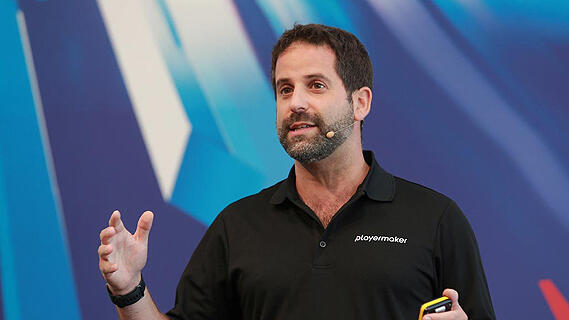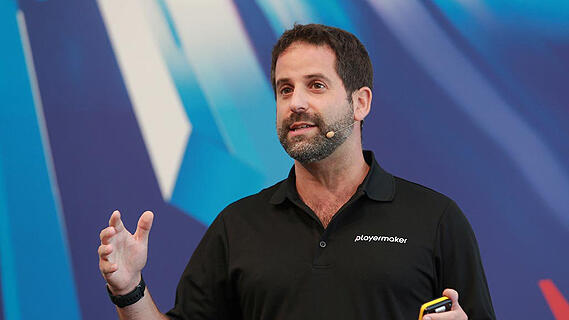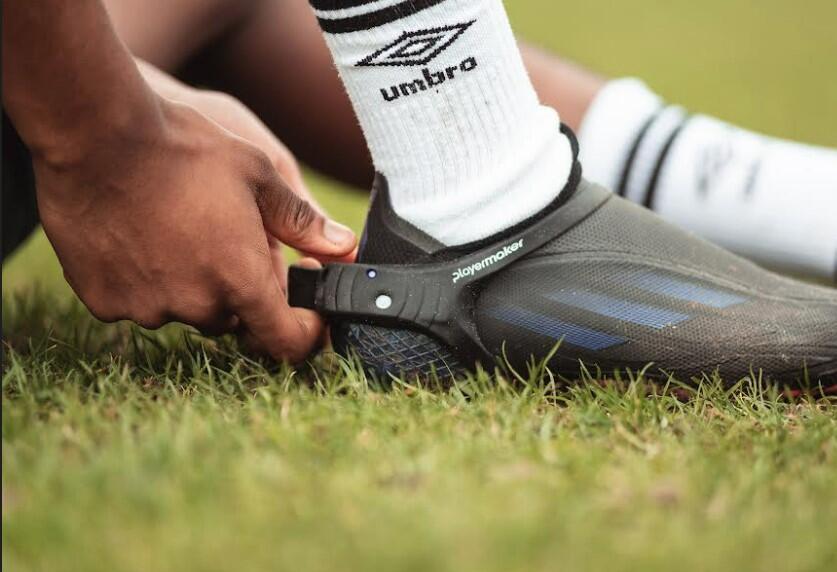
Playermaker helps sporty teenagers tap into tech during soccer games
The Israeli startup's devices can track movement and pressure on the feet allowing players and coaches to easily learn and adapt their strategies via an app
As Israel’s Maccabiah Games continue, and thousands come to Israel for what is widely regarded as “The Jewish Olympics”, companies like Playermaker have a chance to highlight the growing relationship between sports and technology. The company has developed a light device that wraps around the heels of soccer players, tracking their performance and providing them with insights to help improve their games on the pitch.
“We want to bring performance data and insights and make it available and accessible for everyone across the universe,” explained Guy Aharon, CEO and Co-founder of Playermaker. “We are very purpose-driven. The purpose is the data that can create something so that the coach can coach better… a 16-year-old today is flooded with so much exciting stuff on Roblox or Instagram - and classic sports sometimes fail to provide them with the same experience.”
Aharon joined CTech a few hours before the Maccabiah Games’ opening ceremony in Jerusalem. For the first time since 2017, more than 10,000 athletes from 61 countries attended the event which celebrated sportsmanship in the Jewish world. Over the next two weeks, there will be 30,000 competitions at 150 venues hosting 78 tournaments for 42 different sports. In total, there will be 250 football matches.
Playermaker says it is “super proud to support athletes of all ages” during the Maccabiah Games and Aharon calls the device “the great equalizer” among both professionals and amateurs who may want to analyze insights into their performance. Despite not having GPS capabilities, the devices can track movement and pressure on the feet allowing players and coaches to easily learn and adapt their strategies via an app. Today, Playermaker is used by European Premier League teams and academies such as Leicester City, Manchester City, and Liverpool, and it has partnered with Rangers, Hull City, and Fulham FC. It is understood that the Israeli under-16 girls' team will be using Playermaker during the Games.
As young players continue to expect their devices and performances to forever be connected to apps that offer them data, Playermaker is active in a space that is expected to encourage young people to garner the information they crave from their social media channels or their online gaming worlds. Anything from pace, balance, or velocity can be measured and easily shared socially to help young people with their sports performance - and ultimately their physical health. If players miss a practice session, their phone alerts them similar to how language apps like Duolingo or sobriety apps notify users. On a meta level, Playermaker helps with the gamification of a game - taking it from the pitch to the cloud.
Playermaker's devices are already used by hundreds of thousands of soccer players. The devices cost $10-20 per month depending on the tier, and for professional teams, they are more expensive - although Aharon didn’t disclose by how much. He told CTech that he could count on his fingers how many devices had ever broken, signifying their durability. “They were designed to withstand the northern England muddy, snowy, aggressive football game in any league,” he said.
As young players continue to expect their devices and performances to forever be connected to apps that offer them data, Playmaker is active in a space that is expected to encourage young people to garner the information they crave from their social media channels or their online gaming worlds. Anything from pace, balance, or velocity can be measured and easily shared socially to help young people with their sports performance - and ultimately their physical health. If players miss a practice session, their phone alerts them similar to how language apps like Duolingo or sobriety apps notify users. On a meta level, Playermaker helps with the gamification of a game - taking it from the pitch to the cloud.
“It’s like people in the 1980s who refused to use computers - you can last up to a point. Technology is here to stay, it is part of our ordinary life. If you cannot generate data with your smartphone, you'll soon find yourself out of the game,” Aharon concluded.
















